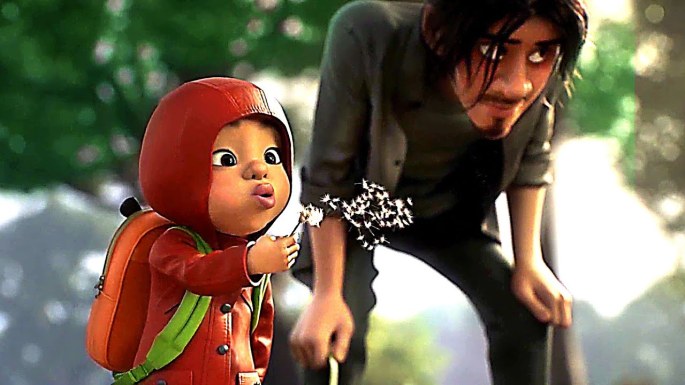Animator Bobby Rubio is father to Alex, a young Autistic boy, and ‘Float’ is his way of sharing their story.
 A scene of Float. / Disney Pixar
A scene of Float. / Disney Pixar
In FLOAT, a father discovers that his son is different from other kids in the most unusual way. To keep them both safe from judgement, Dad covers him and keeps him out of sight— but when his son’s ability becomes public, Dad must decide whether to run and hide or to accept his son as he is…

When Disney Pixar release a new short animated film, it’s usually something to get excited about. When it is written, directed and produced by a parent of an Autistic child, and he uses the film to give us a glimpse into his and his son’s story, then it’s going to be ground-breaking.
‘Float’, a seven-minute animated short, has been created by Pixar animator Bobby Rubio, who has worked on features including ‘Toy Story’, ‘Incredibles 2’ and ‘Inside Out’.
Bobby is father to Alex, a young Autistic boy, and ‘Float’ is his way of sharing their story.
The film doesn’t specifically reference Autism, and indeed could be used as a metaphor for any parent-child relationship where the child is different or diverse, but Bobby and Alex’s story is clear to see in the relationship between the father and boy in ‘Float’.
In the film, the father is playing in the garden with his son; they blow some dandelion seeds which rise up into the air and then suddenly, much to the shock of the father, the boy is floating with them too! His son can float! It’s not dangerous, it’s not hurting anyone, but it’s different and gets noticed, meaning that the boy gets treated differently. Other parents look at him as if he’s weird, or that there is something ‘wrong’ with him.

The father’s response is to hide his son away, keeping him inside and out of view. When they do eventually go out the father keeps his son on a leash and puts rocks in his backpack to stop him from floating away. This works for a while, but then they are in the playground and the boy gets away from his restraints and happily floats around the playground, blissfully unaware of the reaction to him.
The other parents are afraid and the boy’s father, not understanding his son, grabs him and drags him away screaming. Then comes the one line of narrative in the film, words that stop every parent of a disabled, diverse or different child in our tracks, because we’ve all at some point in our darkest moments said it, thought it, or prayed it… “Why can’t you just be normal?!”
It’s a defining moment for the father too… he deeply regrets what he has said and is ashamed, realising too late the hurt and harm that his words have caused. He decides that he, the father, is the one that needs to change; he needs to embrace, accept and understand his son’s difference.
He stops trying to prevent his son from floating, stops worrying about the response of other people, and lets his son float freely. The father has learned a very important lesson, one that is important for us all to learn, that we should not try to change or hold back our different or diverse children, but to let them be who they are, and to celebrate that with them.

The film ends with a dedication from Bobby Rubio to his son which says; “For Alex. Thank you for making me a better dad. Dedicated with love and understanding to all families with children deemed different. ”Words that should resonate with us all.
In the ‘making of’ video for ‘Float’, Bobby Rubio comments that; “When my son was first diagnosed, I didn’t handle it well,” “My wife said, you’re a storyteller, maybe you should tell the story through a comic.” We’re all glad that he did, and that this comic became another great addition to the Disney Pixar lexicon.
You can currently watch ‘Float’ on the Disney+ streaming service, although it should be available in other ways in due course. There are clips from the film, along with interviews with Bobby Rubio, in the links below (some of them you’ll need to skip past the introduction or adverts first!)
Enjoy watching.
Mark Arnold, Director of Additional Needs Ministry at Urban Saints. Arnold blogs at The Additional Needs Blogfather. This article was re-published with permission.
P.S.
Endorsement from Bobby Rubio to this article: “Hi @Mark_J_Arnold Thank you for this wonderful write up! Don’t change a thing! It’s nice to hear that we’re now in the UK! WE are not alone! Please tell your son I said hi!” Bobby Alcid Rubio #wearenotalone #onedadtoanother
Clip from ‘Float’ and interview with Bobby Rubio on KTVU ‘New This Morning’ (from 30 seconds in):https://www.youtube.com/watch?v=U9_qGJD-71g

Las opiniones vertidas por nuestros colaboradores se realizan a nivel personal, pudiendo coincidir o no con la postura de la dirección de Protestante Digital.
Si quieres comentar o